




 |
   |
 |
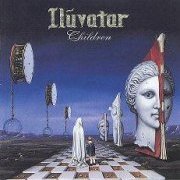 |
Children (1995, 57.45) **½/THazeIn Our Lives Given Away Late of Conscience Cracker Eye Next to Glass Your Darkest Hour The Final Stroke |
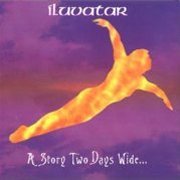 |
A Story Two Days Wide (1999, 59.15) ***/TTSojournsSavant Dreaming With the Lights on Holidays and Miracles Better Days Even Angels Fall Indian Rain |
 |
From the Silence (2014, 55.08) ***/TT |
|
| From the Silence Open the Door Resolution Le Ungairé Moo-Moo Across the Coals The Storm Favorite Son Between |
The Silence! Older Now Until |
|
Current availability:
Mellotrons used:
It has to be said; Ilúvatar (with or without the ´) are solidly, unrepentantly neo-prog. Whether or not this makes your hackles rise is, of course, an entirely personal matter, largely dependent on where you stand on the great Marillion debate, i.e. are they, or are they not shite? Ilúvatar clearly don't think so and have proved it over the course of a handful of rather unimaginative albums, not least their dull self-titled debut.
1995's Children didn't exactly herald a New Dawn Of Prog, being completely bog-standard neo-, its only even slightly unusual (note: not welcome) feature being vocalist Glenn McLaughlin's Phil Collins fixation, along with the usual Fishisms, of course. The rest of the band plod away in time-honoured fashion for at least twenty minutes too long, although twelve-minute closer The Final Stroke is probably the most inventive thing here. As far as Jim Rezek's Mellotron use goes, background choirs on Late Of Conscience and a reasonably upfront string part on The Final Stroke are all I can hear, apparently from M400 #1463. Four years on, A Story Two Days Wide is a marginal improvement, the odd interesting musical idea (Dreaming With The Lights On, Indian Rain) battling it out with the usual musical same old same old. Rezek's more pronounced Mellotron strings can be heard on Sojourns, Savant and Better Days, with choirs on the latter and Indian Rain, but nothing that you couldn't live without, to be honest.
Fast-forward fifteen years and the band returns with 2014's appropriately-named From the Silence and... yes, they've broadened their taste, at least a little, although, sadly, far too many tracks fall back on all the familiar neo-prog clichés. Better material includes the oddly-titled Le Ungairé Moo-Moo, Between and The Silence!, but they're still a band in dire need of a crash-course in lesser-known '70s prog. Rezek plays what I presume is his M400, with cellos on the opening title track's intro, faint choirs and strings on Resolution, upfront strings on Le Ungairé Moo-Moo, more subtle ones on Across The Coals, background strings on Favorite Son and faint choirs on closer Until.
 |
Images in Vogue [EP] (1983, 22.46) ***½/½Lust for LoveMasks Just Like You For Germans Breaking Up |
 |
Collection Version 2.0: Chronology (2004, 76.25) ***/½ |
||
| Travel Quiet Room Politics of Sound Anxiety Reaction Lust for Love Masks For Germans (mix 2) Breaking Up |
Call it Love Save it Promised Land Holiday King's Service In the House Look Me in the Eye Someday |
Piece of Your Heart (version 1) Everytime One Hand Cleanses ... the Other (Where's Kenny?) |
|
Current availability:
Mellotron used:
Little-known outside Canada, Images in Vogue were the Canucks' joint answer to Britain's early '80s synthpop boom, alongside Strange Advance. As far as I can work out, their discography is now partially available, in a rather piecemeal kind of way, split into three volumes of Collection Version..., missing quite a few tracks in the process. Irritating.
1983's Images in Vogue was their third release and second EP; it would be another two years before they released an album. It's a pretty decent effort within its genre, its five tracks utilising drool-worthy Prophet 5s, Memorymoogs and Oberheims, amongst other now sought-after gear. Musically, it cements their reputation as the Canadian Ultravox, with all the right Bowie and Roxy influences, plus an unfortunate hint of Duran Duran in places, but we won't hold that against them. And as for, er, For Germans, shouldn't that be Four Germans. Eh? Eh? The EP contains what is likely to be their sole Mellotron track, Masks, with some background choirs (possibly from Strange Advance's elusive 4-Track) that add to the song without being overly blatant.
2004's Collection Version 2.0: Chronology covers four of the EP's five tracks; it's actually a very nice compilation of their work, previously unreleased instrumental opener Travel setting the scene nicely, followed by another eighteen presumably typical IIV tracks. Moreover, it's the only place to easily find Masks, although you really shouldn't bother just to hear some distant Mellotron choir. Images in Vogue were good at what they did and still reform for occasional (apparently well-attended) gigs. A couple of their members went on to form or work with industrial pioneers Skinny Puppy, but we shouldn't hold that against them, either.
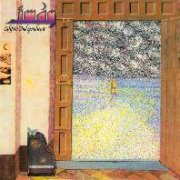 |
Imán, Califato Independiente (1978, 42.11) ***½/TTarantos del Califato IndependienteCanto al Califa Tarantos Estate Quieto, Boabdil Pasco por la Plaza Cuarto Menguante Darshan Cerro Alegre Cancion de la Oruga |
Current availability:
Mellotron used:
Imán, Califato Independiente were one of the all-too many obscure progressive bands from the '70s; Spain in this case, although they were on the local branch of CBS, giving them some local mainstream credibility. Like many Spanish bands from this era, they had a slightly jazzy touch and also brought in a flamenco influence; Imán, Califato Independiente is instrumental and a good example of its genre, particularly the side-long Tarantos Del Califato Independiente.
Marcos Mantero is credited with playing Mellotron (producer Teddy "Canarios" Bautista's M400?) on three out of four tracks, with strings under the Elka string synth on parts one and four of Tarantos Del Califato Independiente, Canto Al Califa and Cuarto Menguante and album closer Cancion De La Oruga, plus a few seconds of choir and more of those mixed strings in Darshan. Confusingly, Mantero also plays a 'Farfisa Syntorchestra', as if the waters needed muddying further. So; a cool album, particularly the sort-of title track, but not really one for the Mellotron fan, I fear. There was a second album, 1980's Camino del Aguila, but it appears to be Mellotron-free.
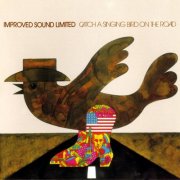 |
Catch a Singing Bird on the Road (1973, 37.32) **½/T |
|
| Humphrey Bogart The Dark Lord Barricade A Poet's Conversation Catch a Singing Bird on the Road Sunday Morning After Church Breed Mountain Moonshine |
Rio Bravo 59 Hot Biscuit Slim |
|
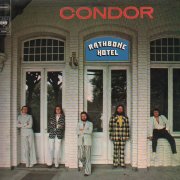 |
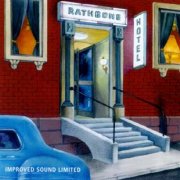 |
Rathbone Hotel [originally as by Condor] (1976, 43.02) **½/T½ |
|
| Number One Tularose Till 9 A.M. If I Could Read Her Mind Stray Cat Old Mexico Nothing's Worrying Me No More Little Sue |
Suicide Road Mortgage Bound for Spain Sonora |
||
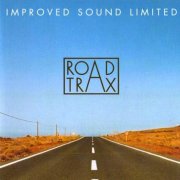 |
Road Trax (2002, recorded 1970-79, 44.09) ***/T |
||
| One Feet Over the Tarmac (instr.) Suicide Road Silver Circles Lisa's Accelerando One Feet Over the Tarmac (voc.) One Note Interlude Bernd's Tune Baker's Round |
Don't Slide Away/One Note Interlude Main Theme Aurore's Tune Greetings to Carlos Fragment of "Route 99" Puppet on a Twelve-String Route 99 Variation on Aurore's Tune |
Main Theme (unplugged) Maniac Lamento Soda Fountain Life is a Jigsaw Puzzle "O.K." |
|
Current availability:
Mellotrons used:
As far as I can work out, Improved Sound Limited were a vaguely proggy outfit who went off the boil around 1973, producing what appears to be their tribute to the Americana of the day, Catch a Singing Bird on the Road. It opens well enough with the surprisingly proggish Humphrey Bogart, before turning up the blind alley of American-sounding soft rock, exemplified by the rest of the record. It's not awful, just rather dull, the odd halfway decent song (the folky title track, Hot Biscuit Slim) keeping the listener from dozing off. And as for the bluesy, blatantly Lord of the Rings-influenced The Dark Lord, the less said the better... Axel Linstädt plays Mellotron strings on opener Humphrey Bogart, as befits the nearest this album gets to 'prog', but it in no way makes this worth getting hold of, I'm afraid.
The band were persuaded to change their name to Condor around 1976, releasing their last album, Rathbone Hotel, under that moniker, although reissues revert to Improved Sound. It's a thoroughly mainstream mid-'70s rock album, utilising elements of the emergent West Coast scene, country rock and rock'n'roll, the end result being somewhat on the lacklustre side. Better tracks include the prog-lite of Bound For Spain and closer Sonora, but it's a little like clutching at straws. Linstädt on Mellotron again, with a full-on strings part opening Little Sue, major string and flute parts on Bound For Spain and occasional strings, combined with string synth, on Sonora.
Alongside their 'normal' career, Improved Sound wrote and recorded film and TV soundtrack music, including work for directors Michael Verhoeven and Wim Wenders. 2002's Road Trax is a posthumous release of some of these, covering (according to their website) three different films, Im Lauf der Zeit, Das Brot des Bäckers and So Weit das Auge Reicht. Perhaps surprisingly, many of the short pieces here are not too dissimilar to their regular work, many being laid-back country rock, complete with pedal steel. Linstädt adds heavily-reverbed Mellotron flutes to Silver Circles and a handful of high string notes, faded in and out again, to One Note Interlude and its reiteration, although the latter could easily be real strings. There's one more collection of Improved Sound soundtrack music, The Final Foreword, but it's resolutely Mellotron-free.
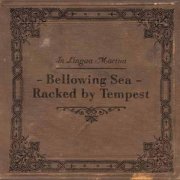 |
Bellowing Sea - Racked By Tempest (2007, 49.26) ***½/TTTTOceanus ProcellarumAwe and Terror Mirage Relinquish Lacus Somniorum From Winsome to Bestial Sowers of Discord The Melancholy Surge |
 |
Salon des Refusés (2010, 44.48) ***½/TTTT |
|
| Full Fathom Five Existence Darkness Catharsis Like the Ocean Into the Mincer Open the Doors of Janus (the Gates of War) Electrocution |
Skjelvende av Angst A Force of Nature Cold Void Messiah |
|
Current availability:
Mellotrons/Chamberlin used:
At first glance, In Lingua Mortua look like just another one of the 17,532 Scandinavian black/death/whatever metal bands in existence and, indeed, as soon as Bellowing Sea - Racked By Tempest kicks in properly, one feels one's hopes begin to fade. However... Unlike most of their contemporaries, they're actually pretty damn' progressive, knowing how to make an album that the non-faithful can actually have a stab at listening to without falling about laughing or bursting into tears. Why? I'm still trying to work it out. Probably because it's more a progressive album with death metal tropes than vice versa, modulating key all over the place and structuring songs in an almost (dare I say it?) Änglagård vein. It's pointless picking out individual tracks; the album's best listened to as a whole anyway, but despite the blastbeats and 'uurgh' vocals, this is remarkably listenable. Mellotron-player-to-the-Norwegian-metal-(and-prog)-community, Lars Fredrik Frøislie, does his usual thing here, sticking Mellotron all over the place, with strings on all highlighted tracks (the only Mellotron-free track, Lacus Somniorum, is under a minute long anyway), with flutes and choir on several and definite cellos on Relinquish, if not others. There are brass parts on the album, too, but with a credited saxophonist, they're more likely to be baritone sax than anything.
The band followed up three years later with Salon des Refusés, essentially more of the same, although the sleeve notes say, "The songs were created and recorded between 2001 and 2008", presumably making much of the material predate that on Bellowing Sea. Like its predecessor, it contains a very workable form of death metal/prog crossover, acoustic interludes being shattered by mad guitar work, roaring vocals and blastbeats. The vocals are a bit hard to take in places, but that sort of goes with the territory... Lars plays not only all keys, but drums and some of the guitar and bass work, making this pretty much his solo project with guests, rather than a band as such. Of course, he splatters one or more of his three M400s all over the album, with strings on most tracks, plus vibes (otherwise uncredited and therefore Mellotronic) on opener Full Fathom Five and Existence and cellos on Catharsis. We also get Lars' beloved new (well, to him) Chamberlin M1 on just one track (he only obtained it recently), presumably providing the massive strings on Like The Ocean, while the album's second instrumental, Electrocution, features a grungy mix of Mellotron cellos, violas and violins, making for another Mellotron Winner.
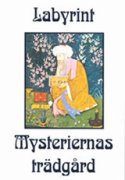 |
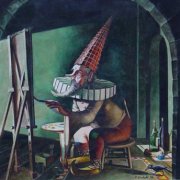 |
Mysteriernas Trädgård [a.k.a. The Garden of Mysteries] (1994/96, 73.53) ***½/TT |
||
| Gates of Andorra Karakoram Pass Escape From Canaan Hiram Abiff Kekova (the Sunken City) Ali Hasan Aslan Meditating Minotauros |
The Garden of Mysteries II Monsoon Andalucy Journey to Hel Moorish Rapsody Trans Turkish Express Aral Moorish Waltz |
Desert Visions Ya Qader The Garden of Mysteries I La Dame Inconnue Almeria Palm-Cat |
||
 |
Walking on Clouds (1999, 56.35/79.10) ***½/TTT½ (TTTT) |
|
| Kali Mahatma Over the Wall The Caravan From Sheeba Birka Lop Nor (the Wandering Lake) Dervish Dreams Golgonda Gates of Oneiron |
Chandrika Walking on Clouds [2007 reissue adds: Sagarmatha Over the Wall (demo version) The Caravan From Sheeba (early version) Vid Sorgens Port (1978 version) Walking on Clouds (early version)] |
|
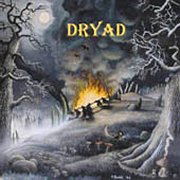 |
Dryad (2002, 59.37) ****/TTT |
|
| Lost in the Woods Out of This Maze Catch a Cloud Nargal Dryad (the Spirit of the Woods) Trident Jabberwocky Muscarin Madness |
Deep Saffron Night of the Baskerville Killer Farewell Little Brother |
|
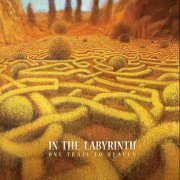 |
One Trail to Heaven (2011, recorded 1993-2004, 59.36) ***½/TTT½ |
|
| Lost in the Woods Escape From Canaan Moorish Rhapsody The Garden of Mysteries II Monsoon Over the Wall Karakoram Waltz Muskarin Madness |
Deep Saffron Night of the Baskerville Killer The Endless City Cities Cloudburst |
|
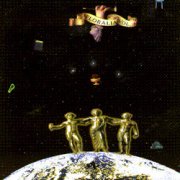 |
Floralia Vol. 3 (1999) ***/T[In the Labyrinth contribute]Sagarmatha |
 |
The Vegetable Man Project Vol. 3 (2004) ***½/TT[In the Labyrinth contribute]Vegetable Man |
 |
 |
Peace Frog Conquer the World (2005) ****/TTT[In the Labyrinth contribute]The Black Plague |
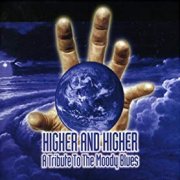 |
Higher & Higher: A Tribute to the Moody Blues (2006) ***½/TT[In the Labyrinth contribute]Cities |
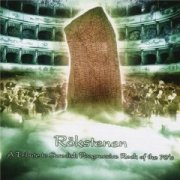 |
Rökstenen: A Tribute to Swedish Progressive Rock of the 70's (2010) ****/T[In the Labyrinth contribute]Worlds on Fire |
Current availability:
Mellotrons used:
Peter Lindahl, born in 1951, formed the ethnic outfit Aladdin's Lantern in Stockholm in 1980, which (very) eventually morphed into Labyrint in the early '90s. After releasing the initially cassette-only Mysteriernas Trädgård, they changed their name to In the Labyrinth (from the recent Dead Can Dance album?) and have been singlemindedly ploughing their world/prog crossover furrow ever since. The tape was reissued under their new name as The Garden of Mysteries in 1996, recently reissued. They made a pretty unique noise, elements of various ethnic musics combining with a modern progressive style to create something new; surely what 'progressive' rock should be all about? About the only clear influence you could point to is that brand of krautrock acts who assimilated 'world' influences before there was such a term, particularly Embryo. Led by the multi-instrumentalist Lindahl, their lineup seems to be fairly fluid apart from his lieutenant, Håkan Almkvist, other musicians obviously being brought in as and when needed.
The Garden of Mysteries sets out their stall quite unequivocally, opening with what sounds like plucked banjo, although it has to be something more exotic, going by the musicians' credits on their site. Their chief ethnic influence is definitely Middle Eastern, carrying on from their Aladdin's Lantern days, when they apparently worked backing belly dancers (!), among other gigs, although all sorts of stuff pops in and out of the mix. Most of the material is instrumental, which seems to work better to my ears than their actual songs. Not actually that much of Lindahl's Mellotron (yes, it's real), with quick flurries of echoed flute on Karakoram Pass, a more 'standard' string part on Kekova (The Sunken City) and what sounds like tape-replay flutes, rather than the real thing, on Ali Hasan. I think the flute on Monsoon is real, but those are definite Mellotron strings on Moorish Rapsody [sic.] and Moorish Waltz, although the flute on the latter is, again, inconclusive.
'99's Walking on Clouds carries on in similar vein, only maybe more focussed, being a real pot pourri of influences, often applied simultaneously. It's difficult to pick out highlights on a single listen, although the Middle Eastern pipes on Golgonda are notable. Not so sure about the vocal tracks, though they're relatively few and far between. Lindahl plays Mellotron on several tracks, mostly strings, although some of the flute work is quite clearly Mellotronic, too. The string parts are mostly upfront, if not actually solo, blending nicely with the more unusual instrumentation, at least to my ears. Mellotronic highlight? Probably the end of Mahatma, although several similar parts could also qualify. More Mellotron on the 2007 reissue, with background strings on Sagarmatha, upfront ones on the demo version of Over The Wall, string and flute lines on the early version of The Caravan From Sheeba, Three years on, Dryad is actually slightly less 'world' than its predecessor, although sitars, darboukas, tablas and the like still proliferate. The vocal tracks here seem better integrated into the album as a whole; in fact, 'well-integrated' is a phrase that sums the record up in general. Lindahl's diverse influences come together more smoothly here, at least to my ears, making for a more satisfying listen all round. Marginally less Mellotron than on Walking on Clouds, a similar mixture of about 90% strings to 10% flutes, with Muscarin Madness only featuring a few seconds of the latter.
At first glance, 2011's One Trail to Heaven looks like your typical common-or-garden compilation, mostly familiar material with a handful of unreleased tracks to draw in the faithful. However, upon closer perusal, it seems that several (all?) of the previously-released tracks are actually alternate versions, making this a rather better bet for the casual listener. Musically, it's all exactly as you'd expect, Northern European folk through a Middle Eastern filter, possibly at its best on opener Lost In The Woods, Monsoon and Karakoram Waltz, originally available on Musea's One World Tapestry various artists benefit album. Plenty of Lindahl's Mellotron work, including parts on several of those alternate versions, with a brief strings-into-flute line on Lost In The Woods, flutes and strings on Moorish Rhapsody, flutes on The Garden Of Mysteries II and Monsoon, including a full-on solo on the latter, strings on Over The Wall, flute runs on Karakoram Waltz and Muskarin Madness and varying levels of strings on Deep Saffron, Night Of The Baskerville Killer, The Endless City and Cities, all played with a welcome restraint.
As you can see, Lindahl's contributed to several various artists efforts, including the relatively obscure Peace Frog Conquer the World, with the excellent The Black Plague, Mellow's Higher & Higher: A Tribute to the Moody Blues, with his take on Nights In White Satin b-side Cities and Musea's Rökstenen: A Tribute to Swedish Progressive Rock of the 70's, with Worlds On Fire, originally released by the utterly obscure Handgjort. Mellotron on all three (of course), The Black Plague being the best of these. Lindahl has also released a Mellotron-featuring version of early, officially-unrecorded Syd-era Floyd classic Vegetable Man, on The Vegetable Man Project Vol. 3, which I'll review when I get to hear it.
See: Samples etc. | Peace Frog Conquer the World | Higher & Higher | Rökstenen
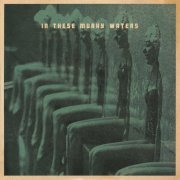 |
In These Murky Waters (2019, 50.02) ***½/TTTT½ |
|
| Adventures in Central Park Memories and Tape Ophelia We Came From the Ocean Burn Bridges Burn Berlin Zoo Postcard Carnival |
Roll the Dice Ann-Marie Tears on a Green Sequined Dress Rooms of Faded Photographs |
|
Current availability:
Mellotron/Chamberlin used:
In These Murky Waters are Mattias 'original Änglagård drummer' Olsson's latest project, a collaboration with vocalist Ewik Rodell, sounding not dissimilar to his other female-fronted projects, notably 2004's AK-Momo. Yes, it's a lazy comparison, but the stylistic similarity is undeniable. If you've heard some of his previous solo/duo work, you'll know what to expect: murky (see what I did there?) rhythm tracks from the Optigan, overlaid with a slew of disc- and tape-replay sounds, sounding something like an indie band, had they formed in the '40s. Top tracks? Probably the suitably carnivalesque Carnival, if your idea of such comes from the works of Ray Bradbury and closer Rooms Of Faded Photographs.
Mattias plays exclusively Mellotron and Chamberlin (and Optigan and Orchestron), with various combinations of cellos, flutes, strings and choirs across the board, notable other uses being the pitchbent strings on opener Adventures In Central Park, the church organ on Ophelia, timps on Burn Bridges Burn, Chamby muted brass on Postcard, some naughty Yes samples on Carnival, presumably from the equally naughty M4000D, Chamby guitars and male voice and Mellotron bees (no, really) on Roll The Dice and sampled MkII rhythms on Rooms Of Faded Photographs. Now; a caveat: Mattias' definition of 'Mellotron' clearly encompasses the digital variety, so it's not always easy to say what's real and what isn't, other than those specific MkII and 'special sets' (like the Yes tapes), but I wouldn't be surprised if some of the Chamberlin sounds aren't exactly tape-generated, either. Well, they were originally, but you know what I mean. Does it matter? Up to you. If you've heard and liked any of the oddball albums Mattias has produced over the last couple of decades, you'll like this one, too. Recommended.
 |
Kankaku Shikou (1974, 36.02) ***½/T½Original #1 Claude DebussyOriginal #2 L. van Beethoven Original #3 L. van Beethoven |
Current availability:
Mellotron used:
According to the estimable folk at the ProgNotFrog blog (try saying that quickly), a Japanese quartet confusingly called ARP released a single in 1974, the band name mysteriously changing to Yasuo Inada & Bemi Family somewhere along the line. After some fury and a lineup change, they recorded an album, Kankaku Shikou, consisting of contemporary reworkings of classical pieces and featuring Inada rather heavily on the sleeve. Can you spot the originals? Some of the piano (acoustic and electric) parts are familiar, but when the other keys lurch over the horizon, any pretence at attempting to copy the originals disappears. The Debussy and first Beethoven are marvellous, worth the price of admission alone, although the (relatively) brief second Beethoven is awful, a vocal number that sounds nothing like any Ludwig van B. that I've ever heard. Stylewise, the two good tracks (between them, five sixths of the album's length) alternate solo piano and band arrangements, Inada blasting away on Hammond, Solina and at least two different synths, in proper full-on prog style.
Inada also plays Mellotron, of course (look closely: it's behind the Rhodes on the sleeve), with massive, albeit rather brief choir parts on the Debussy and first Beethoven pieces, although it really isn't enough to make it worth hearing for that alone.
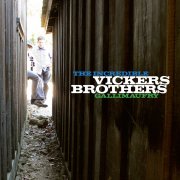 |
Gallimaufry (2008, 40.12) ***/T |
|
| Blues for Frankie Valli What She Does Things Slowly Change We're Gonna Get Along Fine English Rose Late Bloomer Ballad of an Orange Peel Top of the Stairs |
Girl and Her Time Magic Like That Tomorrow Record Collection Blues |
|
Current availability:
Mellotron used:
The Incredible Vickers Brothers are The Orange Peels' Bob Vickers' amusing conceit, crediting himself as both Bob and Rob, on an album often described as being at the 'twee end of powerpop'. Slightly unfair, as material such as English Rose, Top Of The Stairs and amusing, Victrola-channeling Record Collection Blues are far better than that sounds, while nothing here is any worse than 'average'.
Vickers and Orange Peels co-conspirator Allen Clapp both play Mellotron, although it's only obvious on one track, Tomorrow, as that is not a Mellotron on Girl And Her Time. Anyway, we get a repeating high string line, underlaid with a complementary part, presumably one played by each musician, also presumably real, as it could go either way on this one.
See: The Orange Peels
 |
Good Enough to Eat! (1999, recorded 1969, 27.10) ***/TT |
|
| It's Been a Hard Hard Day Big Ben Is it Love The Kids Are Alright Baby I Love You Brother Where Are You I Gotta Love You Again Take a Little Bit of Lovin' |
The Rest of My Life Take Me for One Last Ride In Too Deep The World is Ended Right Now |
|
Current availability:
Chamberlin used:
Several years after originally writing this review, I received an e-mail from Indescribably Delicious (known universally as I.D.)'s vocalist, Jim Conroy, giving me the true story of the band and 1999's cobbled-together Good Enough to Eat! They were an L.A. Bay Area beat group who formed in the early '60s and released one single on a local label, also home to the iconic Strawberry Alarm Clock. After the band split, their ex-manager, Gary Solo(mon), got Jim to sing on some demos he was recording with Greg Munford, who sang on the Clock's legendary Incense And Peppermints. Jim wasn't over-keen on the material, but was eventually sent an acetate of the rather amateurish sessions, with the three I.D. tracks added. About a decade later, Jim was persuaded to part with a copy of the acetate to a record-collector friend. Fast-forward a decade or two...
In the late '90s, Jim got a call from the Strawberry Alarm Clock's old manager, Bill Holmes, whingeing about a European bootleg of songs that he 'owned'; turns out some chancers have put the acetate out as a CD, crediting it to Indescribably Delicious. Holmes sued and got the rights back to the recordings, subsequently licencing them out himself, getting material from Jim for the package. It crept out some months later as Good Enough to Eat!; Holmes has evaded any tedious financial responsibilities, meaning Jim won't get any royalties from the release, despite having sung on the whole thing. It's the same old, same old story, isn't it? Anyway, to the actual album:
It's (unsurprisingly, all things considered) a bit of a mish-mash of styles, the three tracks from their lone single session (The Kids Are Alright/Baby I Love You/Brother Where Are You) rubbing shoulders with the demos, which are of a rather dated psychedelic bent. Their version of The Who's The Kids Are Alright has a wrong chord, which can apparently be blamed on Solo's rearrangement of the song, much of the rest being OK, but really nothing special. In 1969, the Mellotron had barely had any impact in the States at all, although, of course, the originator of the tape-replay concept, Harry Chamberlin, had been building his machines in California since the early '50s. As a result, the 'is it/isn't it?' dilemma hovering over this album is resolved by its final track, The World Is Ended Right Now, which is smothered in that weird Chamberlin solo male voice, proving beyond a doubt that the Chamby had vocal tapes several years before the Mellotron. Anyway, keyboards were played by both Munford and Jack Bielan, so I've no idea which one plays the Chamby, but there are also strings on Big Ben, one of the album's more psychedelically-inclined numbers and on the more straightforward The Rest Of My Life.
So; a rather ordinary album, probably best described as a 'curio', to be honest. Three Chamberlin tracks, but apart from the male vocal (which may just possibly crop up elsewhere, too), it's all rather run-of-the-mill. Jim Conroy's clearly fairly unhappy about the whole business, though also fairly sanguine and who can blame him? As he says, he's still playing today and has never had to do the crapola 'oldies' circuit, like so many one-hit wonders. To sum up, this album is NOT the original I.D., except for three tracks, and they aren't especially representative of the band's garage glory.